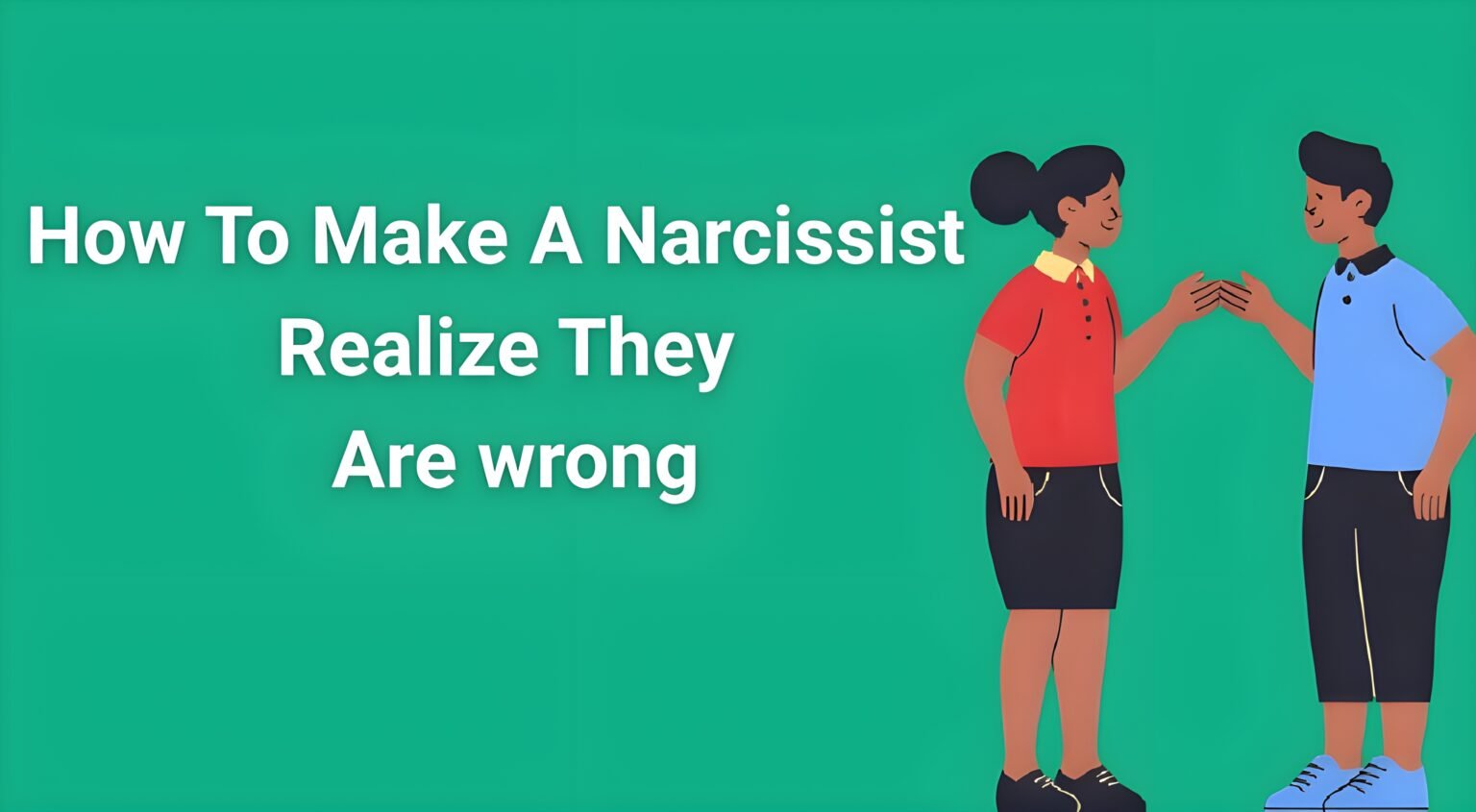Are you desperately trying to figure out how to make a narcissist realize they are wrong, only to feel like you’re hitting a brick wall every single time? You’re not alone in this exhausting struggle. Millions of people worldwide find themselves trapped in conversations where up becomes down, facts become fiction, and somehow they’re always the villain in every story.
- Understanding Why Narcissists Struggle to Admit They’re Wrong
- 7 Proven Tactics to Help a Narcissist Realize They’re Wrong
- What to Do When These Tactics Don’t Work
- When You Can’t Leave: Survival Strategies
- Understanding the Trauma Bond
- The Path Forward: Focusing on What You Can Control
- Professional Support and Resources
- Frequently Asked Questions
- Conclusion: Reclaiming Your Power and Peace
The truth is, getting a narcissist to acknowledge their mistakes requires a completely different approach than what works with emotionally healthy people. Traditional logic, heartfelt appeals, and direct confrontation often backfire spectacularly, leaving you more frustrated and confused than before.
But here’s what most people don’t realize: there are research-backed strategies that can help you navigate these impossible situations more effectively. While we can’t guarantee any narcissist will suddenly become self-aware, understanding the psychology behind their behavior and applying specific tactics can significantly improve your chances of being heard.
Understanding Why Narcissists Struggle to Admit They’re Wrong
Before diving into strategies for helping a narcissist recognize their errors, we need to understand the psychological mechanisms that make this so challenging in the first place. Research from Oregon State University reveals that narcissists don’t learn from their mistakes because they genuinely don’t believe they make any.
The Protective Ego Mechanism
Narcissists operate from a place of deep-seated shame and insecurity, despite their outward appearance of confidence. Their grandiose self-image serves as psychological armor against feelings of inadequacy. Admitting wrongdoing would crack this protective shell, exposing them to the very emotions they’ve spent years avoiding.
Dr. Craig Malkin, a psychologist at Harvard Medical School, explains that narcissists weren’t given secure love during childhood. They learned early that their worth was conditional on being perfect, achieving success, or meeting impossible standards. This creates an adult who cannot tolerate being wrong because it triggers childhood feelings of being fundamentally flawed.
The Counterfactual Thinking Deficit
When most people face negative outcomes from their decisions, they engage in “should counterfactual thinking” – mentally reviewing what they could have done differently. This natural process helps us learn and grow from mistakes. However, research shows that narcissists rarely engage in this reflective process. Instead, they blame external factors, other people, or circumstances beyond their control.
7 Proven Tactics to Help a Narcissist Realize They’re Wrong
1. Use the Mirror Technique
The mirror technique involves reflecting their behavior back to them in a way that allows them to see it from an outside perspective. Instead of directly accusing them of being wrong, you help them recognize inconsistencies in their own logic.
How to implement this tactic:
- Ask questions that lead them to their own conclusions
- Use their own words against them: “Yesterday you said X, but today you’re saying Y. Help me understand how both can be true.”
- Remain genuinely curious rather than confrontational
Example in action: Instead of saying “You’re contradicting yourself,” try: “I’m trying to understand your perspective. Last week you mentioned that punctuality shows respect, but you’ve been 30 minutes late to our last three meetings. How should I interpret that?”
2. Present Irrefutable Evidence
Narcissists excel at gaslighting and rewriting history, but concrete evidence is much harder to dispute. This approach works best when you can document their words or actions objectively.
Effective evidence presentation:
- Keep detailed records of conversations, emails, and incidents
- Use screenshots, recordings, or written documentation when appropriate
- Present facts without emotional commentary
- Stay focused on specific behaviors rather than character judgments
Remember to check local laws regarding recording conversations, and always prioritize your safety when gathering evidence.
3. Appeal to Their Self-Interest
Since narcissists are primarily motivated by their own needs and image, framing mistakes in terms of how they affect the narcissist can be surprisingly effective. This approach bypasses their defensive mechanisms by aligning your concerns with their priorities.
Strategic self-interest appeals:
- “When you interrupt clients during meetings, it might hurt your reputation as a professional listener.”
- “Your team seems disengaged lately. As their leader, what impact might that have on your quarterly review?”
- “I noticed some people left early from your presentation. You might want to consider adjusting your approach to keep them engaged.”
4. Use Strategic Validation Before Confrontation
This approach, based on dialectical behavior therapy principles, involves validating something genuine about the narcissist before addressing the problematic behavior. This lowers their defenses and makes them more receptive to feedback.
The validation sandwich method:
- Start with genuine acknowledgment of their strengths or efforts
- Address the specific behavior that needs attention
- End with confidence in their ability to improve
Example: “I really appreciate how passionate you are about this project – your enthusiasm is contagious. I’ve noticed that when you cut people off during brainstorming sessions, some good ideas might get lost. I know you want the best possible outcome, so maybe we could try a structured approach where everyone gets a chance to speak?”
5. Implement Consequence-Based Reality Testing
Sometimes the most effective teacher is natural consequences. This approach involves stepping back and allowing the narcissist to experience the results of their behavior without rescuing them from the outcomes.
How to implement consequence-based learning:
- Stop covering for their mistakes or smoothing over relationships they’ve damaged
- Allow them to face the natural results of missed deadlines, broken promises, or damaged relationships
- Resist the urge to say “I told you so” when consequences occur
- Be prepared for them to blame external factors initially
Important safety note: Only use this approach when the consequences won’t cause serious harm to innocent parties, including yourself.
6. Engage Their Intellectual Pride
Many narcissists pride themselves on being intelligent or logical. You can sometimes breakthrough their defenses by appealing to their intellectual self-image and challenging them to think through problems analytically.
Intellectual engagement strategies:
- “I’m curious about your thought process here. Can you walk me through your reasoning?”
- “As someone who values logical thinking, how would you analyze this situation objectively?”
- “What do you think a neutral third party would conclude if they looked at this evidence?”
This approach works particularly well with cerebral narcissists who have built their identity around being smarter than others.
7. Create Collaborative Problem-Solving Opportunities
Instead of positioning yourself as the one pointing out their mistakes, invite the narcissist to join you in solving a problem. This approach can help them discover their own errors without feeling attacked or diminished.
Collaborative framing techniques:
- “We seem to have different perspectives on what happened. How can we figure out the most accurate version?”
- “I’m noticing some challenges in our communication. What ideas do you have for improving our interactions?”
- “This situation isn’t working well for either of us. What solutions come to mind?”
When narcissists feel like partners in problem-solving rather than targets of criticism, they’re more likely to consider alternative viewpoints.
What to Do When These Tactics Don’t Work
Despite your best efforts and these research-backed strategies, you may find that the narcissist in your life remains completely unwilling to acknowledge any wrongdoing. This isn’t a reflection of your failure – it’s often an indication that you’re dealing with someone whose psychological defenses are too rigid to allow for self-reflection.
Recognizing the Limits of Change
Understanding narcissistic behavior patterns helps you set realistic expectations. Research consistently shows that personality disorders are extremely difficult to treat, and change typically requires the individual to actively seek help – something most narcissists resist doing.
Signs that your efforts may not be working:
- They consistently deflect blame onto others
- They rewrite history to make themselves the victim
- They escalate their defensive behaviors when confronted with evidence
- They refuse to engage in any form of self-reflection
Protecting Your Mental Health
When someone repeatedly refuses to acknowledge their harmful behavior, continuing to pursue acknowledgment can become emotionally damaging for you. This is where understanding your own limits becomes crucial.
If you find yourself:
- Obsessively thinking about their behavior
- Losing sleep over their reactions
- Doubting your own perceptions of reality
- Feeling emotionally drained after every interaction
It may be time to reassess your approach and consider whether this relationship is sustainable in its current form.
Sometimes the confusion becomes so overwhelming that you need professional clarity about what you’re actually dealing with. Getting an expert analysis of your specific situation can provide the validation and understanding you desperately need to make informed decisions about your next steps.
When You Can’t Leave: Survival Strategies
Not everyone has the luxury of walking away from a narcissistic relationship immediately. Whether it’s a spouse, family member, boss, or co-parent, sometimes you need strategies for surviving and protecting yourself while you work toward a long-term solution.
When you find yourself in this position, it’s important to know that you’re not powerless. There are specific survival strategies designed for people who must remain in challenging situations while planning their next steps. Understanding how to protect your mental health and maintain your sense of reality during this period is crucial for your long-term well-being.
Documenting Everything
Keep detailed records of conversations, incidents, and behavioral patterns. This documentation serves multiple purposes:
- Validates your experiences when you’re doubting yourself
- Provides evidence if you need legal protection later
- Helps you identify patterns and triggers
- Creates accountability for their behavior
Building Your Support Network
Narcissists often isolate their victims from friends and family. Rebuilding and maintaining connections with supportive people is essential for your psychological well-being and safety.
Consider reaching out to:
- Trusted friends who knew you before the relationship
- Family members who understand the situation
- Support groups for narcissistic abuse survivors
- Mental health professionals who specialize in trauma
Developing an Exit Strategy
Even if you can’t leave immediately, having a plan can provide hope and direction. Your exit strategy might include:
- Financial planning and independence building
- Legal consultation and documentation
- Safe housing arrangements
- Professional skill development for career independence
Understanding the Trauma Bond
One of the most confusing aspects of narcissistic relationships is why it feels so difficult to let go, even when the relationship is clearly harmful. This phenomenon, known as trauma bonding, creates a powerful psychological connection that can feel stronger than love itself.
The Addiction-Like Nature of Trauma Bonds
Trauma bonds function similarly to addiction in the brain. The intermittent reinforcement schedule – periods of kindness followed by cruelty – creates the same neurological pathways as gambling or substance addiction. Your brain literally believes it needs this person to survive, making logical decision-making extremely difficult.
Understanding this neurological component can help explain why willpower alone isn’t sufficient to break free from harmful relationships. Just like treating addiction requires more than wanting to quit, healing from trauma bonds requires specific therapeutic approaches and often professional support.
Breaking Free from the Cycle
If you recognize that you’re trauma bonded to a narcissist, structured recovery approaches can help you reclaim your emotional freedom. This process typically involves:
- Understanding the science behind your attachment
- Developing coping strategies for emotional regulation
- Rebuilding your sense of reality after gaslighting
- Reclaiming your identity outside the relationship
- Creating prevention strategies for future relationships
Many people find that day-by-day structured programs work more effectively than willpower alone because they address the neurological addiction aspect of trauma bonding. These step-by-step approaches help retrain your brain’s response patterns through consistent daily practice, making the healing process more manageable and sustainable.
Professional trauma-informed therapy, combined with peer support and educational resources, provides the most comprehensive approach to recovery.
The Path Forward: Focusing on What You Can Control
While you cannot force a narcissist to realize they’re wrong or change their behavior, you have complete control over your own responses, boundaries, and life choices. This shift in focus – from trying to change them to empowering yourself – often marks the beginning of real healing and progress.
Setting Realistic Expectations
Accept that meaningful change in narcissistic individuals is rare and typically requires intensive professional intervention that they must choose for themselves. Your energy is better invested in:
- Protecting your own mental health
- Building skills for effective communication
- Developing strong personal boundaries
- Creating safety and stability in your life
Building Your Own Clarity
Sometimes the most important realization isn’t whether the narcissist admits they’re wrong – it’s gaining absolute clarity about your own experience and needs. When you stop questioning your perceptions and start trusting your instincts, you regain the power to make informed decisions about your relationships and future.
Professional assessment can be invaluable during this process. Getting an expert analysis of your specific situation can provide the validation and clarity you need to move forward confidently, whether that means improving the relationship dynamic or planning your exit strategy.
Professional Support and Resources
Dealing with narcissistic individuals can be emotionally exhausting and psychologically damaging. Professional support isn’t just helpful – it’s often essential for maintaining your mental health and making clear-headed decisions about your situation.
When to Seek Professional Help
Consider reaching out for professional support if you’re experiencing:
- Constant self-doubt about your perceptions
- Anxiety or depression related to the relationship
- Isolation from friends and family
- Physical symptoms of chronic stress
- Difficulty making decisions about your future
Types of Professional Support
Different types of professional support serve different needs:
Individual Therapy: Trauma-informed therapists who understand narcissistic abuse can help you process your experiences, rebuild your self-esteem, and develop coping strategies.
Specialized Assessment: Sometimes you need expert validation of what you’re experiencing. Professional assessment can provide clarity about relationship dynamics and help you understand your options.
Support Groups: Connecting with others who have similar experiences can reduce isolation and provide practical advice from people who truly understand.
Legal Consultation: If you’re dealing with custody issues, financial abuse, or safety concerns, legal professionals can help you understand your rights and options.
Frequently Asked Questions
Can a narcissist ever truly change?
While personality change is possible, it’s extremely rare and requires the narcissist to acknowledge their problems and commit to intensive, long-term therapy. Most experts agree that it’s unwise to stay in a harmful relationship hoping for change that may never come.
Why do I keep trying to make them see the truth?
This compulsion often stems from trauma bonding and the intermittent reinforcement you’ve received from the relationship. Your brain has been conditioned to believe that if you just find the right words or approach, you’ll get the validation and acknowledgment you need.
Is it my fault that they won’t listen to me?
Absolutely not. A person’s willingness to engage in self-reflection and acknowledge mistakes has nothing to do with how well you communicate and everything to do with their own psychological makeup and coping mechanisms.
Should I give them one more chance?
This decision is deeply personal, but consider whether you’ve already given multiple chances without seeing meaningful, sustained change. Also consider the cost to your own mental health and well-being.
How do I know if I’m being too harsh in my judgment?
Trust your instincts. If multiple people in their life have had similar experiences, if you find yourself constantly walking on eggshells, or if you’re questioning your own reality, these are signs that your concerns are likely valid.
Conclusion: Reclaiming Your Power and Peace
Learning how to make a narcissist realize they are wrong ultimately teaches us more about ourselves than about them. While the tactics outlined in this guide can improve your communication and increase your chances of being heard, the most important insight is understanding that you cannot control another person’s willingness to engage in honest self-reflection.
Your worth, your perceptions, and your emotional well-being are not dependent on getting acknowledgment from someone who may be incapable of providing it. True healing begins when you stop waiting for external validation and start trusting your own experience.
The energy you’ve been pouring into trying to change their mind can be redirected toward rebuilding your confidence, planning your future, and surrounding yourself with people who value honesty, empathy, and mutual respect. Whether you choose to continue the relationship with better boundaries or decide to step away entirely, you now have the tools and understanding to make informed decisions that prioritize your safety and well-being.
Remember, you deserve relationships where your feelings matter, your perspective is valued, and conflicts are resolved through genuine dialogue rather than manipulation and blame-shifting. Don’t settle for less than the respect and care you would offer others. Your peace of mind and emotional freedom are worth fighting for – and they’re completely within your power to achieve.






